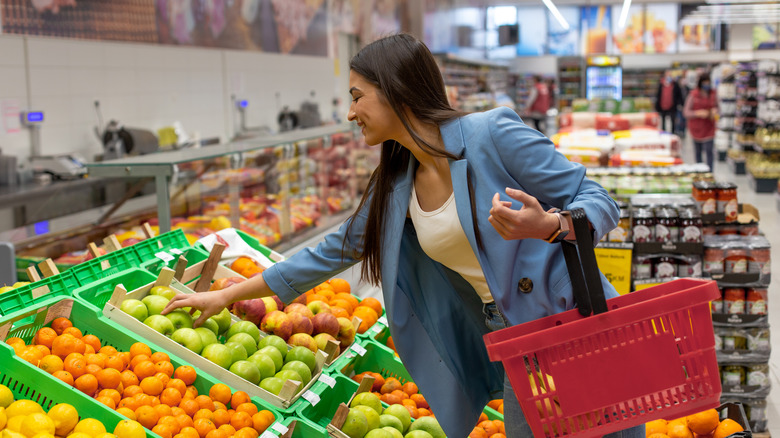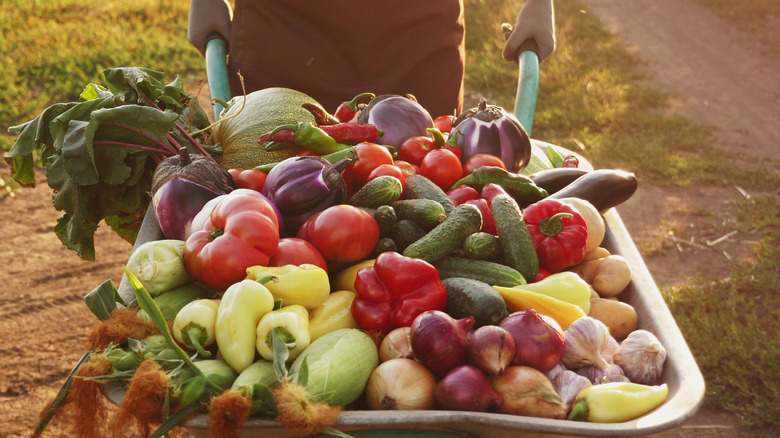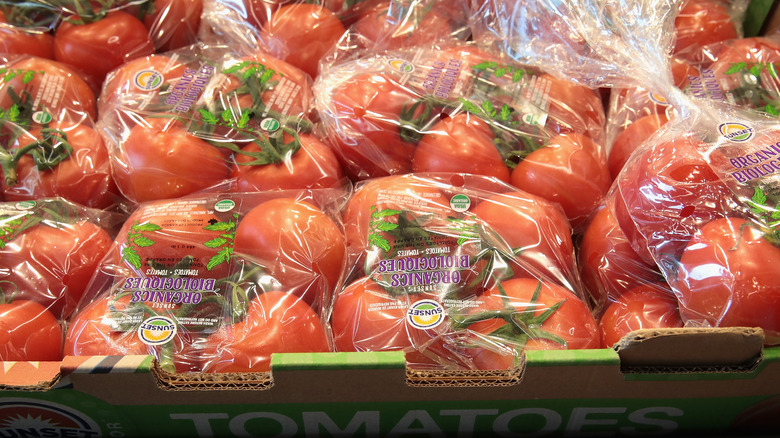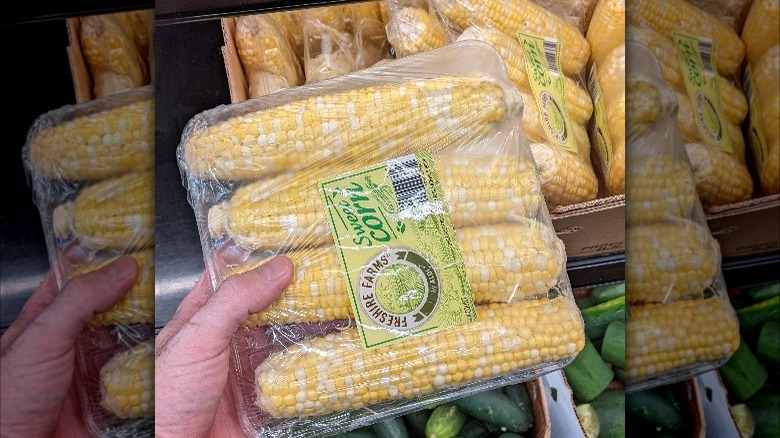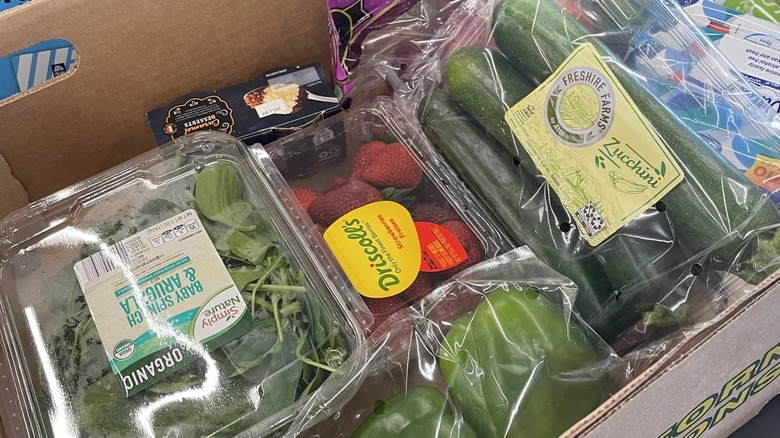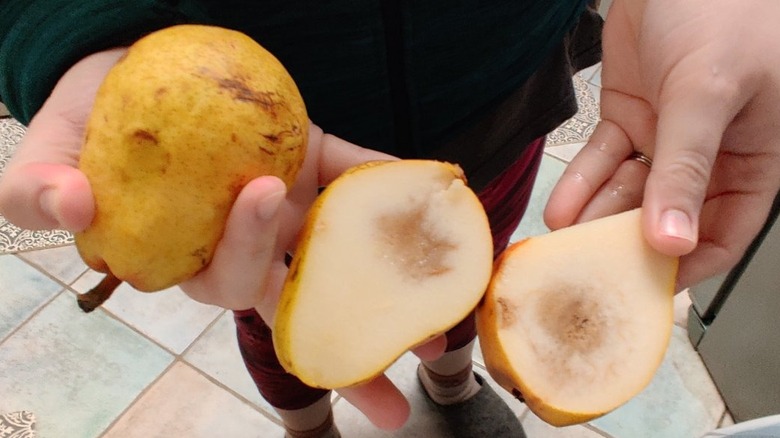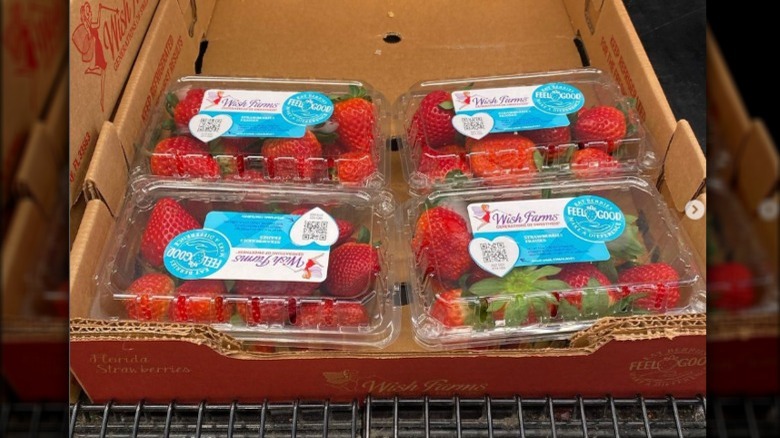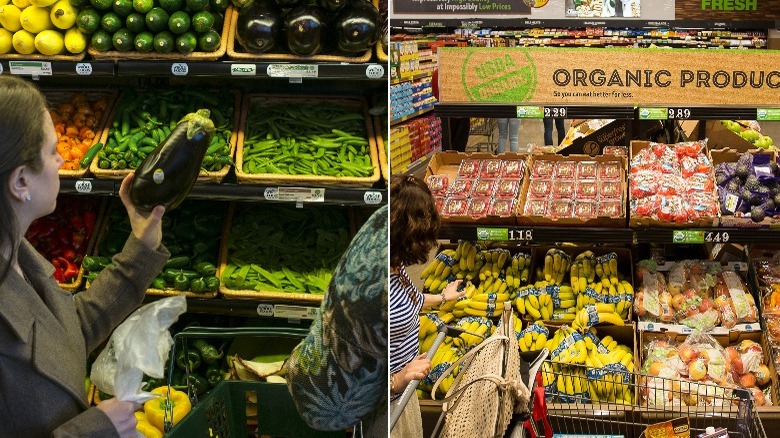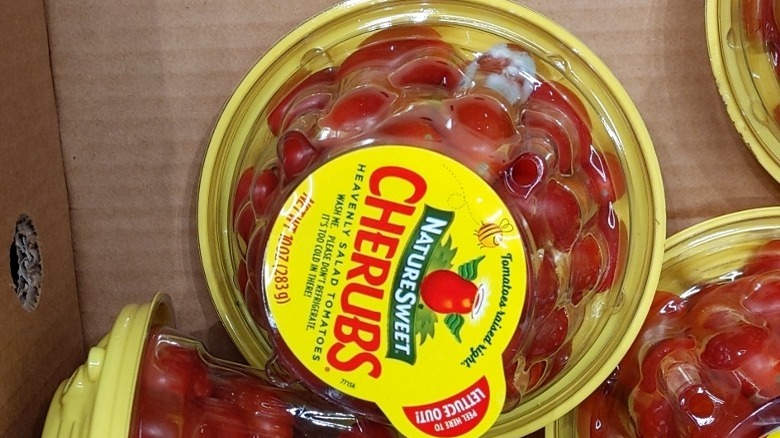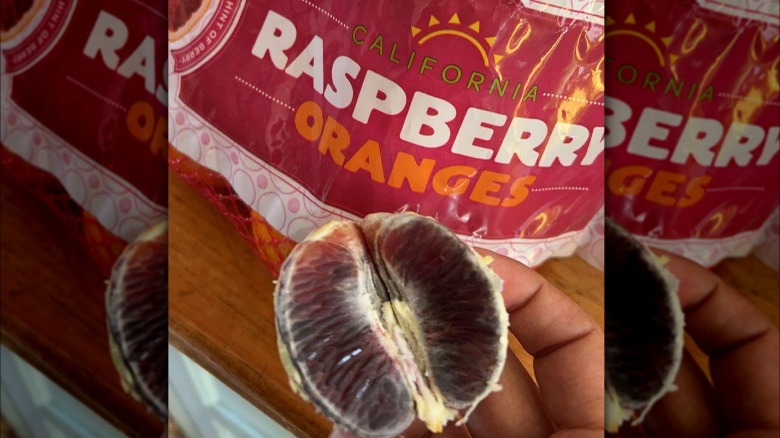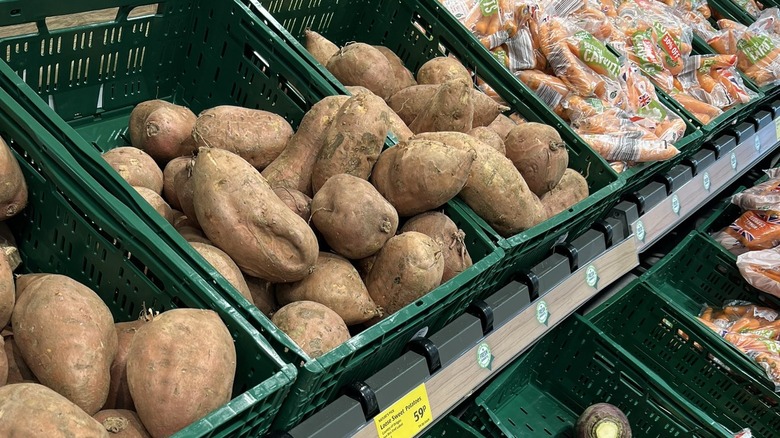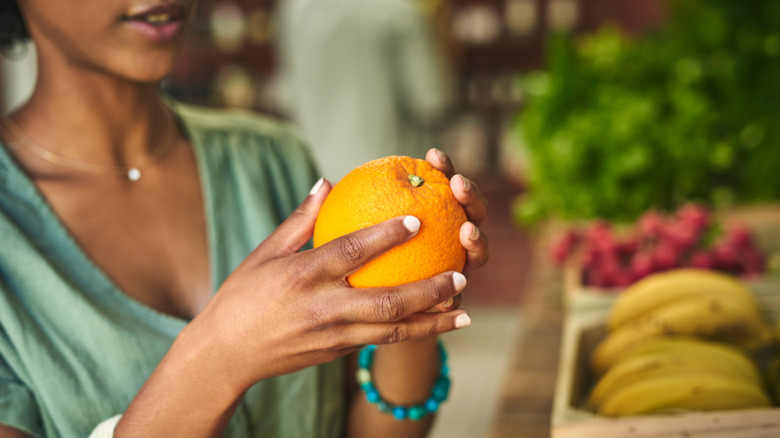Secrets Of The Aldi Produce Aisle You'll Wish You Knew Sooner
Aldi has been growing over the past several years, expanding into 39 states and with more than 2,900 stores spread across America. It's also been named the country's most popular grocery store, thanks to its low prices, small stores that are quick to maneuver around, and excellent selection of products, from organic and keto-focused items to unique snacks, fresh meats, and its famous Aisle of Shame.
Of course, we can't forget about the Aldi produce aisle, which Aldi stores revamped in the last few years to make it more appealing to health-focused customers. With wider aisles and an expanded refrigerated section for veggies that need a little cooling to stay fresh, Aldi has made it clear that its produce aisle is a prime focus for the company.
Aldi enthusiasts rave about the Aldi produce aisle, often comparing it to those of other stores they shop at, including widespread retailers popular around the country. For example, one Twitter user admits that their local Aldi's produce "is the same or better than" the produce a bigger, more expensive supermarket nearby sells. If you're not sure what the fuss is about, wondering if the Aldi produce aisle is worth your time, or you feel like you're missing out on shopping tips you didn't know, this guide should help.
Aldi buys much of its produce locally
If you're a frequent shopper in Aldi's produce aisle, you've probably noticed that it very rarely — maybe never, depending on your store — seems low in fresh fruits and veggies. Truth be told, many of the Aldi stores we've been to are consistently overflowing with produce in both the refrigerated and non-refrigerated produce sections. And, most of the time, the produce looks fresh and tasty.
These benefits of the Aldi produce aisle are effects of the store's relationships with local farmers. According to the Aldi website, the produce the company's stores receive is locally grown and sourced by Aldi to put directly into their produce aisle. Of course, what items you find at your local Aldi store are a matter of farmer proximity and what they sell. Not all produce grows well in all areas, so while your Aldi apples might be locally grown, your bananas might ship from another part of the country. If you want to know the details about what produce comes from your local farms, reach out to your local Aldi.
Some produce is prepackaged for a reason
What else makes Aldi's produce aisle stand out? Many of the company's produce items are prepackaged. Take its tomatoes, for instance. You can typically find these in on-the-vine or off-the-vine varieties packaged together in a plastic bag, while other stores might offer loose tomatoes for customers to comb through and pick the ones they wish to buy. You'll also find husked and packaged corn on the cob and prepackaged squash, zucchini, apples, and oranges, to name a few.
The company benefits in a few ways from packaging items this way. First, it likely reduces the number of bruised fruit and vegetables that Aldi workers must spend time sorting through and reduces food waste. It also eliminates weighing many of these foods, saving time at the checkout counter (and we all know how quickly Aldi workers try to get you through the line!).
For customers, though, all the extra packaging and being forced to buy items in bulk when you may only need one or two of a fruit or vegetable is somewhat of a pain point with the Aldi produce aisle. So, if you're new to Aldi and shop its produce, just note that many items come already packaged and, therefore, might cost you more in potential food waste.
Aldi is cutting down on excessive produce packaging to boost sustainability
Aldi customers also dislike prepackaged produce due to the seemingly extensive packaging used for some items. One Redditor, for example, posted a photo of four pieces of corn on the cob with their husks removed, placed in a plastic tray, and wrapped in plastic. Additional commenters in the thread mention that they've also seen cucumbers, zucchini, and other produce wrapped unnecessarily in plastic, with some customers even turning away from Aldi and to local farmer's markets that use more sustainable practices.
It seems that Aldi has gotten wind of customer distaste for its extraneous plastic use, though, because the company has been implementing some environmentally friendly strategies to reduce its carbon footprint by 2025. According to Aldi, the company is working toward having all of its company packaging made from 100% recyclable, reusable, or compostable materials, and using at least 15% less packaging materials for its products. If the company sticks to the plan, we should see a reduction in plastic-wrapped fruits and vegetables in the produce aisle by 2025. This plan was originally announced in 2019, so you may start to see some changes made in your local Aldi store now.
Aldi has some of the cheapest produce prices in the industry
One thing about Aldi's produce aisle that many people agree on is that it usually boasts the cheapest fruit and vegetable prices you'll find, whether you shop at big box retailers or smaller, more local grocery stores. Homegrown Hillary conducted its own consumer survey to find the grocery stores with the least expensive produce, and 67% of respondents agreed that Aldi won the battle. Ramsey Solutions, an expert money-saving resource, also lists Aldi as the cheapest grocery store overall, beating out other national favorites like Walmart and Costco.
How does Aldi keep its produce prices so low? For the same reasons its prices in general typically beat its competitors. Aldi spokesperson Karla Wattleton told Fox 4 a few secrets, such as Aldi maintaining a relatively low stock, which results in less time being spent stocking and reduces the overhead that raises company costs. Additionally, the checkout process is designed to move fast, which increases employee efficiency and keeps costs down. These budget-friendly strategies get passed along to every area of the store, including the produce aisle, to help customers save money.
There are some fruits and vegetables customers often stay away from
Just because Aldi produce is often cheaper than produce in other grocery stores and is sourced locally whenever possible doesn't necessarily make its bananas the best in the bunch. In fact, the produce aisle seems to be one of Aldi's most polarizing features, with customers either loving it or hating it. While some shoppers consistently find healthy-looking and tasty fruits and vegetables, others are usually disappointed with quickly-rotting or tasteless produce.
Much of this depends on the Aldi location, as some stores might get fresher produce than others depending on their proximity to Aldi distribution centers and the number of farms nearby. For example, Kelly Anne Smith compared shopping trips at Aldi and Trader Joe's to determine the cheaper store for The Penny Hoarder. Smith said that, despite Aldi's produce being much cheaper, bruised tomatoes, browned bananas, and a swarm of fruit flies in the produce aisle deterred her from loving the selection. Still, Smith admits that it may just be that she visited an under-par store.
However, there are some fruits and vegetables that Aldi shoppers tend to stay away from or complain about more than others, like pears, which can be hard, dry, and fast to rot. Some Redditors note issues with organic greens and salads becoming slimy quickly, while others say that avocados have their good and bad days, and you're never sure which you might experience at Aldi.
Produce boxes double as grocery holders for Aldi trips
If you haven't yet visited Aldi, you need to know that the store doesn't supply free bags like other grocery stores often do. Instead, if you don't arrive with your own reusable bags, you'll have to either buy brown or reusable bags from Aldi or let everything you purchase slide around in your trunk until you get home.
Or, you can join others in one of the Aldi community's best-kept secrets: Take empty boxes from the produce aisle and stash your groceries in them as you shop. Yes, this is allowed, as you'll quickly notice if you decide to join Aldi-focused Facebook groups or follow Aldi shoppers on Instagram. Store employees likely enjoy the help, as all the boxes you take mean fewer boxes for them to remove to make room for new stock.
Because Aldi positions its produce aisle toward the entrance in many of its stores, you can give it a fast scan to see what boxes are available to grab before you start shopping. Boxes in the produce aisle are great for holding smaller items, like baked goods, snacks, cheeses, or spices. If you have bigger items in your cart, seek boxes in other aisles instead, like those in the Aisle of Shame or cereal aisle.
Aldi redesigned its produce aisles to shadow Whole Foods
In 2017, Aldi began transforming many of its stores with fresh updates to keep it more competitive with other popular grocery chains, especially those most known for their focus on fresh and healthy foods. Some of the first stores to receive the Aldi updates mimicked 365 by Whole Foods, noted a Business Insider writer who visited one of the updated stores. 365 by Whole Foods was a discounted version of Whole Foods with more locally sourced produce, making it a relatively direct Aldi competitor.
The newer Aldi stores saw larger produce aisles with a fresher look, somewhat reminiscent of how farmer's markets tend to be set up. The refresh also included new store lighting placed strategically over the produce aisle to highlight all the fresh foods you can find there. When Aldi first announced the upcoming changes, the company stated that its main target was expanding fresh items like produce in its stores, ultimately leading to a $1.6 billion investment. So, if you're new to Aldi shopping, don't be surprised if the produce aisle looks similar to other fresh-food-focused stores you frequent.
The Aldi Twice as Nice Guarantee may not apply to all produce
Although many frequent Aldi shoppers know that the store supposedly offers one of the most generous return policies around, new shoppers aren't always in on Aldi's best-kept secret until they go deep down the Aldi rabbit hole. Aldi's Twice as Nice Guarantee isn't something that's well advertised, but it exists, and it's definitely something to keep in the back of your mind. Basically, the policy states that if you return something due to quality concerns, Aldi will not only replace the item but will also give you a full refund on that item. Just bring the receipt to your store.
Aldi states that non-food items aren't covered under the policy, like plants, body care items, and alcohol, nor are items from national brands. One would assume, then, that produce would be covered under the Twice as Nice Guarantee. Unfortunately, that may not always be the case. In a Reddit thread, a person claimed that, although they were able to get an exchange on moldy tomatoes they bought, they didn't also receive a refund. Others chimed in that they were under the impression that produce wasn't covered, although some posters said the policy covers produce.
Long story short: Your local Aldi store may handle produce differently regarding replacements and refunds, so don't automatically assume you'll be able to use the Twice as Nice Guarantee with your fruits and veggies.
You might be lucky enough to find pineberries or other unique produce
Have you ever heard of pineberries? No? You're not alone. However, many people who shop at Aldi spot these unique berries that look like pink strawberries. This rare find isn't always in stock, so when shoppers do come upon them, they often grab a carton to try.
Reviews of Aldi pineberries run the gamut, though. One Redditor called them "absolutely tasteless," while another commenter snubbed them as "the LaCroix of Strawberries." However, other commenters in the same Reddit thread love them, noting that they're typically tasty and sweet. Either way, these pink berries create a lot of buzz in the Aldi community.
Pineberries aren't the only random items you might find in the produce aisle. Look around, and you may spot Honey Bombs, which are sweet golden on-the-vine tomatoes, raspberry oranges, and tri-color potatoes – items that aren't always in stock at Aldi and ones you may not discover at other stores.
There's no need to wait until Wednesday for fresh produce restocks
It's relatively common knowledge within the Aldi community that Aldi stores restock many items on Wednesdays. Frequent Aldi shoppers who are fans of the Aisle of Shame, in particular, know that Wednesday morning is usually the best day and time to shop their local Aldi stores. That's because the shelves get fresh items and the Aisle of Shame is completely restocked with new Aldi Finds, a mix of both food and non-food items that won't stay on Aldi shelves forever. However, there's no need to wait until Wednesday to buy freshly stocked produce at Aldi.
We mentioned earlier that Aldi sources some of its produce locally. This strategy, in addition to providing customers with fresh produce from local growers, means that those products are typically restocked daily in stores. Therefore, it's unlikely you'll see empty boxes of bagged spinach or low stocks of fresh oranges when you arrive — unless it happened to be an extremely busy day in the produce aisle.
Be careful about what you buy from produce end caps
When you first enter the produce aisle at Aldi, you'll likely notice produce sitting on the endcaps in the middle of the aisle. These endcaps are mostly there to draw your attention over to the produce aisle and are sometimes saved for on-sale produce for shoppers to see easily.
Aldi employees also use them to stock produce they can't typically fit elsewhere. For instance, one employee explained on Reddit that they sometimes place produce they wouldn't typically stock in those endcaps there because they don't have room for them otherwise. Another employee complained in the same Reddit thread that a lot of food goes to waste in the endcaps because they're items that do best in refrigeration, like mushrooms and grapes, and endcaps aren't refrigerated.
When shopping the produce endcaps, consider what's there and take a few minutes to examine the products. Are the items usually refrigerated? Do they look like they have limited time left before going bad? If you'd answer yes to either question, consider skipping over the endcap's offerings, unless you plan on using your produce the same day.
You can check produce prices and availability before heading to your Aldi store
Aldi has continuously shown a desire to remain competitive in the grocery space, and one of the more recent ways it's done that is by launching its online grocery store. Aldi launched the expansion a few years ago by partnering with Instacart for online ordering and home delivery but later opened its own online store, allowing people to shop through Aldi's system rather than Instacart's.
The website can even come in handy for Aldi shoppers who prefer going into the store to shop for themselves. With this feature, you can check your store's prices and item availability in advance of visiting, thereby helping you plan your shopping list and stick to your budget. You can even add items to your online cart to estimate how much you can expect to spend at the store. Just be sure to plug in your zip code to locate your store before you browse, which will provide the most accurate information for the store at which you'll be shopping.
